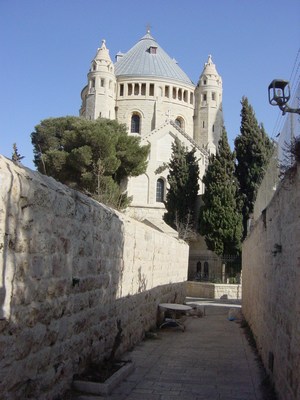Zion
Zion is a term that holds significant historical, religious, and cultural connotations across various contexts. In its most traditional sense, Zion refers to a hill in Jerusalem, which, over time, has come to symbolize the city itself and, more broadly, the Promised Land or a utopian ideal of harmony and peace. The concept of Zion has deep roots in Judaism, Christianity, and other religious traditions, where it embodies the idea of divine love, protection, and eventual salvation.
Etymology and Historical Significance[edit | edit source]
The name "Zion" originally applied to a specific hill in Jerusalem, the easternmost of the two hills of ancient Jerusalem. In the Hebrew Bible, Zion is often synonymous with Jerusalem, the City of David, and the location of the Jewish Temple. The etymological origins of the word are debated, but it is thought to derive from a Semitic root meaning "fortress" or "castle."
Religious Contexts[edit | edit source]
Judaism[edit | edit source]
In Judaism, Zion is mentioned extensively in the Tanakh (Hebrew Bible), where it initially referred to the fortress of Jerusalem, later the City of David, and eventually the dwelling place of God. The concept of Zion holds a central place in Jewish religious thought, symbolizing the land of Israel itself and the idea of return and redemption. The longing for Zion has been a significant aspect of Jewish prayer and ritual, especially in the context of the Diaspora and the hope for the return to Jerusalem.
Christianity[edit | edit source]
In Christianity, Zion takes on additional layers of meaning. It is seen as the spiritual center of the world and a symbol of the New Jerusalem, a heavenly city described in the Book of Revelation. For Christians, Zion represents the ultimate reunion with God, a place of universal peace and justice. The concept of Zion in Christian theology often intersects with eschatological themes, including the second coming of Jesus Christ and the establishment of the Kingdom of God.
Other Traditions[edit | edit source]
The concept of Zion also appears in other religious and cultural traditions, sometimes in contexts that blend religious symbolism with political and social aspirations. For example, the Rastafari movement views Zion as a symbol of freedom and divine protection, often associated with Africa as the promised land for people of African descent.
Zion in Modern Culture[edit | edit source]
Beyond its religious connotations, Zion has permeated various aspects of modern culture, including literature, music, and political discourse. It has come to represent ideals of freedom, salvation, and utopia, transcending its original religious meanings. In music, particularly in reggae and Rastafarian music, Zion is often mentioned as a place of peace and redemption. In literature and film, Zion can symbolize a quest for a better world or a lost paradise.
Controversies and Interpretations[edit | edit source]
The concept of Zion has not been without controversy, particularly in the context of the Israeli-Palestinian conflict. For some, Zion represents national and religious aspirations; for others, it is tied to political claims and conflicts over land. The diverse interpretations of Zion reflect its complex history and the interplay of religion, culture, and politics.
Conclusion[edit | edit source]
Zion remains a powerful symbol with rich meanings that vary across different contexts. Its significance extends from ancient religious texts to contemporary discussions about identity, belonging, and the quest for peace. As a concept, Zion encapsulates the human aspiration for a place of safety, divine presence, and ultimate redemption, making it a perennially relevant and deeply resonant idea in human culture.
Search WikiMD
Ad.Tired of being Overweight? Try W8MD's physician weight loss program.
Semaglutide (Ozempic / Wegovy and Tirzepatide (Mounjaro / Zepbound) available.
Advertise on WikiMD
|
WikiMD's Wellness Encyclopedia |
| Let Food Be Thy Medicine Medicine Thy Food - Hippocrates |
Translate this page: - East Asian
中文,
日本,
한국어,
South Asian
हिन्दी,
தமிழ்,
తెలుగు,
Urdu,
ಕನ್ನಡ,
Southeast Asian
Indonesian,
Vietnamese,
Thai,
မြန်မာဘာသာ,
বাংলা
European
español,
Deutsch,
français,
Greek,
português do Brasil,
polski,
română,
русский,
Nederlands,
norsk,
svenska,
suomi,
Italian
Middle Eastern & African
عربى,
Turkish,
Persian,
Hebrew,
Afrikaans,
isiZulu,
Kiswahili,
Other
Bulgarian,
Hungarian,
Czech,
Swedish,
മലയാളം,
मराठी,
ਪੰਜਾਬੀ,
ગુજરાતી,
Portuguese,
Ukrainian
Medical Disclaimer: WikiMD is not a substitute for professional medical advice. The information on WikiMD is provided as an information resource only, may be incorrect, outdated or misleading, and is not to be used or relied on for any diagnostic or treatment purposes. Please consult your health care provider before making any healthcare decisions or for guidance about a specific medical condition. WikiMD expressly disclaims responsibility, and shall have no liability, for any damages, loss, injury, or liability whatsoever suffered as a result of your reliance on the information contained in this site. By visiting this site you agree to the foregoing terms and conditions, which may from time to time be changed or supplemented by WikiMD. If you do not agree to the foregoing terms and conditions, you should not enter or use this site. See full disclaimer.
Credits:Most images are courtesy of Wikimedia commons, and templates, categories Wikipedia, licensed under CC BY SA or similar.
Contributors: Prab R. Tumpati, MD




